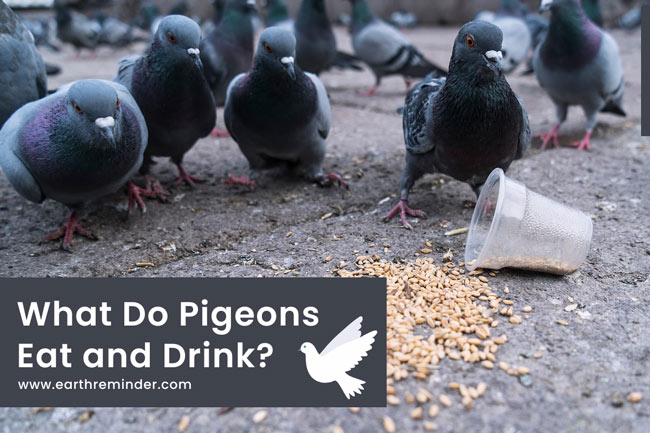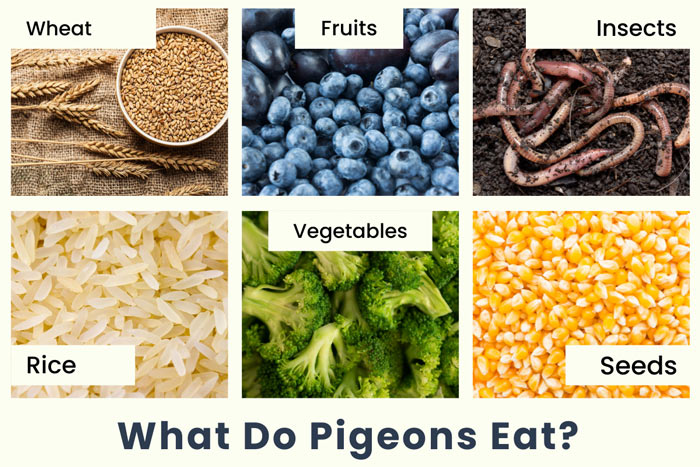What Do Pigeons Eat and Drink?
Around the world, pigeons, also known as rock doves, are commonly seen in cities and suburban areas. Pigeons live in the wild usually on cliffs and rocky outcroppings, although they are capable of adjusting to urban environments. Pigeons have a broad diet in their natural environments, which includes seeds, grains, fruits, and insects. Depending on where they live, they might also eat leaves and flowers from plants. They are very flexible and can find food in many different places, which allows them to live in different environments. Here, we will focus on pigeons’ diet in the wild.
Table of Contents
What Do Pigeons Eat In The Wild?
Pigeons living in cities have adjusted well to living near humans and eating the same food as us. This means they eat pretty much anything that people eat. In cities, pigeons mostly rely on people as a source of food. But, the diet of wild pigeons differs significantly from that of urban pigeons. In order to survive, wild pigeons rely on the natural environment around them. Here are some examples of the foods that wild pigeons typically eat:
Seeds and Grains
Pigeons get their energy and nutrition from seeds and grains. They offer carbohydrates, proteins, and dietary fiber to pigeons. They eat grass seeds, plant seeds, and cultivated crops. Common types of seeds and grains consumed by pigeons include grains like wheat, sorghum, barley, rice, corn, millet, and oats. These are plentiful in various habitats, so pigeons can easily access them.
Fruits
Pigeons receive essential nutrients from fruits, such as vitamins, minerals, and fiber. A pigeon can eat a lot of different fruits depending on where they live. Blueberries, plums, cherries, raisins, grapes, apples (without seeds), pears, and even figs are common fruits that pigeons eat in the wild.
Vegetables
Vegetables aren’t their main food source, but pigeons can eat certain types if they’re available. Pigeons may eat cauliflower, cabbages, sprouts, broccoli, beans, and leafy green veggies in the wild.
Insects
Wild pigeons are omnivores. Insects provide pigeons with protein and other essential nutrients, so they can maintain their energy levels and grow. Pigeons occasionally eat worms and ants in the wild. They can catch insects in the air, as well as on the ground.
As we’ve already discussed above, pigeons eat seeds, fruits, and grains depending on their environment, besides insects.
Also Read: Pigeon Keeping for Beginners | Pigeon Care and Feeding.
What Pigeons Don’t Eat in The Wild?
Pigeons occasionally receive food that is unfit for their diet when it is fed to them by humans. Some foods you should avoid in a pigeon’s diet are listed below. It’s preferable to refrain from giving pigeons any of these meals.
- Salty Foods: Feeding pigeons salty foods and snacks can harm their health. They enjoy these foods but they can get dehydrated because salt makes them thirsty and they might not have enough water. Pigeons aren’t good at handling too much salt in their bodies, so it’s best to avoid giving them salty treats.
- Avocados: Avocados contain a substance called persin, which harms birds’ internal organs. Pigeons’ hearts, livers, kidneys, and even lungs can all be destroyed by avocados. It’s ideal if you avoid giving avocados to pigeons or other birds in particular.
- Caffeine: Pigeons often end up eating things that are thrown away. Some of these things can be drinks that have caffeine and alcohol in them. These substances are harmful to pigeons and can hurt their hearts. Caffeine can raise heart rate, induce arrhythmias, and cause hyperactivity in birds.
- Garlic and Onions: Chemicals in onion and garlic can make pigeons weak and cause anemia. These substances can also irritate their mouths and throats. It’s better for pigeons to avoid eating onion and garlic in their diet.
- Chocolate: Chocolate includes theobromine, which can kill pigeons and induce severe, life-threatening medical issues in birds, including convulsions. Pigeons should never be given any chocolate treats under any circumstances.
Also Read: Why Are Birds Important to the Environment?
What Do Pigeons Drink?
Water is the main source of hydration for wild pigeons. Similarly, to other birds, pigeons require fresh and clean water to stay hydrated. Wild pigeons will consume a range of liquids depending on the water sources available in their surroundings. The following are some key points about what wild pigeons drink:
- The primary sources of water used by wild pigeons for drinking include rivers, lakes, ponds, and puddles. Additionally, they can drink from artificial water sources such as water troughs, fountains, and birdbaths.
- Pigeons can rely on human-made sources of water, like water pipes, drains, or even open containers such as buckets or discarded items that collect rainwater.
- Pigeons can also obtain water from their food. They eat moist foods, including seeds and insects.
- Pigeons sometimes drink rainwater collected on roofs, leaves, or other surfaces.
- Pigeons drink more water in hot weather or when they’re active.
Pigeons do not consume soda or any other sweetened beverages. They do not consume tea or coffee because they are not a natural component of their diet or may be unhealthy.
Also, milk shouldn’t be offered to birds. Because birds are lactose intolerant, dairy products should be eaten in moderation. Feeding the wrong thing to birds can worsen the situation and even kill them by disrupting their digestive system.
Also Read: Baby Pigeon: How I saved an Injured Pigeon?
Conclusion
Pigeons are omnivorous birds that eat a range of things in the wild. They naturally eat insects, seeds, grains, fruits, and other things. Due to their unique digestive system, pigeons can eat both hard and dry foods. Also, they have a powerful beak that they use to crack open seeds and nuts. Pigeons are adaptable birds living in various habitats, and their diet can change depending on the food supply.
Pigeons frequently scavenge for food scraps and eat from bird feeders in urban settings, but they may also go foraging for food on the ground in remote locations. They tend to be opportunistic eaters who can adapt to various food sources to survive in the wild. As a whole, wild pigeons eat a diverse diet that allows them to survive and thrive in a variety of habitats. As a species, they are able to find and consume a wide variety of foods, which makes them a common sight in both urban and natural environments.

